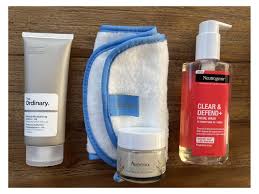Navigating skincare during the teenage years can be challenging, but establishing a natural skincare routine can help maintain healthy skin while avoiding harsh chemicals. This guide will walk you through an effective and natural skincare routine specifically tailored for teenage girls.
1. Understanding Teenage Skin
Table of Contents
1.1 Hormonal Changes
Teenage skin often experiences hormonal changes that can lead to increased oil production, acne, and sensitivity. Understanding these changes is the first step to creating an effective skincare routine.

1.2 Importance of a Routine
Consistency is key in skincare. Establishing a routine helps manage skin issues and promotes long-term skin health. Starting a natural skincare routine early on sets the foundation for healthy skin in the future.
2. Basic Steps of a Natural Skincare Routine
2.1 Cleansing
Why Cleansing Matters: Cleansing removes dirt, oil, and impurities from the skin. It’s the foundation of any skincare routine.
Natural Cleanser Options: Choose a gentle, natural cleanser. Look for ingredients like aloe vera, chamomile, and tea tree oil. Products free from sulfates and parabens are ideal.
2.2 Toning
Why Toning Matters: Toners help balance the skin’s pH levels and remove any leftover impurities.
Natural Toner Options: Witch hazel, rose water, and green tea are excellent natural toners. They soothe the skin and reduce inflammation.
2.3 Moisturizing
Why Moisturizing Matters: Moisturizers keep the skin hydrated and protect it from external aggressors.
Natural Moisturizer Options: Opt for lightweight, non-comedogenic moisturizers with ingredients like jojoba oil, shea butter, and aloe vera.
2.4 Sun Protection
Why Sun Protection Matters: Sunscreen is crucial to protect theNatural Skin from harmful UV rays, preventing premature aging and skin cancer.
Natural Sunscreen Options: Look for mineral sunscreens with zinc oxide or titanium dioxide. These ingredients provide broad-spectrum protection without irritating sensitive skin.
3. Additional Steps for Specific Skin Concerns

3.1 Acne Treatment
Natural Remedies for Acne: Tea tree oil, honey, and aloe vera have antibacterial properties that can help treat acne. Spot treatments with these ingredients can reduce inflammation and prevent breakouts.
3.2 Exfoliation
Why Exfoliation Matters: Exfoliating removes dead skin cells, promoting a brighter complexion and preventing clogged pores.
Natural Exfoliation Options: Use gentle exfoliants like oatmeal, ground almonds, or sugar scrubs. Limit exfoliation to 1-2 times per week to avoid irritation.
3.3 Face Masks
Benefits of Face Masks: Face masks can provide deep cleansing, hydration, and nourishment.
Natural Face Mask Recipes:
- For Oily Skin: Mix bentonite clay with apple cider vinegar.
- For Dry Skin: Combine avocado with honey.
- For Combination Skin: Use yogurt and turmeric.
4. Creating a Natural Skincare Routine
4.1 Morning Routine
- Cleanse: Start with a gentle cleanser to remove overnight oils.
- Tone: Apply a natural toner to balance the skin.
- Moisturize: Use a lightweight moisturizer.
- Sun Protection: Apply a natural sunscreen.

4.2 Evening Routine
- Cleanse: Remove makeup and impurities with a gentle cleanser.
- Tone: Use a natural toner to prepare the skin for moisturizing.
- Moisturize: Apply a more hydrating moisturizer or a natural oil like jojoba or rosehip oil.
- Spot Treatment: Apply natural acne treatments if needed.
5. Tips for Healthy Skin
5.1 Stay Hydrated
Drinking plenty of water helps keep the skin hydrated and flushes out toxins. Aim for at least 8 glasses of water a day.
5.2 Maintain a Healthy Diet
A balanced diet rich in fruits, vegetables, and healthy fats supports skin health. Foods high in antioxidants, like berries and leafy greens, can improve skin’s appearance.
5.3 Get Enough Sleep
Adequate sleep is essential for skin regeneration. Aim for 8–10 hours of sleep each night to allow the skin to repair and renew.
5.4 Manage Stress
Stress can exacerbate skin issues like acne. Practice stress management techniques such as meditation, yoga, or deep breathing exercises.
6. Common Mistakes to Avoid
6.1 Over-Cleansing
Cleaning too often can strip the skin of its natural oils, leading to dryness and irritation. Stick to cleansing twice a day.
6.2 Using Harsh Products
Avoid products with harsh chemicals and fragrances. They can irritate the skin and cause long-term damage.
6.3 Popping Pimples
Popping pimples can lead to scarring and infection. Instead, use natural spot treatments to reduce inflammation.
7. Choosing the Right Products

7.1 Reading Labels
Learn to read product labels and identify harmful ingredients. Avoid sulfates, parabens, and synthetic fragrances.
7.2 Patch Testing
Always patch-test new products to ensure they don’t cause an allergic reaction. Apply a small amount to a discreet area and wait 24 hours.
8. Natural Ingredients to Look For
8.1 Aloe Vera
Aloe vera is soothing and hydrating, making it perfect for all skin types. It can also help heal acne and reduce inflammation.
8.2 Tea Tree Oil
Tea tree oil has antibacterial and anti-inflammatory properties, making it an excellent natural acne treatment.
8.3 Rose Water
Rose water helps balance the skin’s pH and provides a refreshing, hydrating boost.
8.4 Honey
Honey is a natural humectant, drawing moisture into the skin. It also has antibacterial properties, making it great for acne-prone skin.
9. DIY Natural Skincare Recipes
9.1 Gentle Oatmeal Cleanser
Ingredients:
- 1/2 cup ground oats
- Water
Instructions:
- Mix ground oats with water to form a paste.
- Gently massage onto the face.
- Rinse with warm water.
9.2 Refreshing Cucumber Toner
Ingredients:

- 1 cucumber
- 2 tablespoons rose water
Instructions:
- Blend the cucumber and strain the juice.
- Mix with rose water.
- Apply to the face with a cotton pad.
9.3 Hydrating Avocado Mask
Ingredients:
- 1/2 avocado
- 1 tablespoon honey
Instructions:
- Mash the avocado and mix with honey.
- Apply to the face and leave for 15 minutes.
- Rinse with warm water.
10. When to See a Dermatologist
10.1 Persistent Acne
If acne persists despite a good skincare routine, consult a dermatologist. They can provide treatments tailored to your skin type.
10.2 Severe Allergic Reactions
If you experience severe allergic reactions or skin irritation, seek professional advice immediately.

10.3 Unusual Skin Changes
Any unusual changes in your skin, such as moles or rashes, should be evaluated by a dermatologist to rule out serious conditions.
Conclusion
A natural skincare routine for teenage girls focuses on gentle, effective products that cater to changing skin needs. By understanding your skin, choosing the right products, and maintaining a consistent routine, you can achieve healthy, glowing skin. Remember, the key to great skin is patience and consistency. Embrace the journey and enjoy the process of taking care of your skin naturally.
